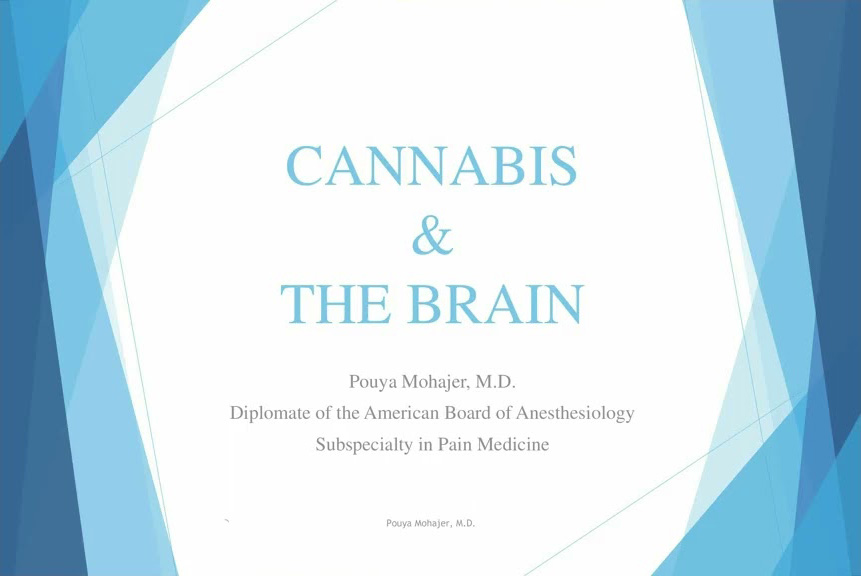
Welcoming back Dr. Pouya Mohajer to our monthly webinar series, he brings his latest research on the long-term and short-term effects in the human mind when you start getting high. Cannabis in the brain is an area of medicinal cannabis that has been somewhat controversial, partially due to relatively-nuanced research and some public misconceptions.
As one of the leading medical voices in Nevada’s cannabis community, Dr. Mohajer brings some of his extensive research in response to these misconceptions, and facts on cannabis in the brain are not yet known to a vast general public.
Dr. Pouya Mohajer
Dr. Pouya Mohajer is a renowned anesthesiologist and M.D. in the field of pain management, most notably for his involvement in cannabis as a medicine. As a Director of Spine and Interventional Medicine, cannabis rings very closely to his work in pain management (as cannabis has been shown to be a notable treatment for chronic pain and spinal injuries), but his research extends beyond that into the plant’s neurological impact in humans.
With several decades of research and experience from some of the top programs in the country, Harvard, Rush-Presbyterian St. Jude’s Medical Center and UCLA, Dr. Mohajer has put medical innovation and the well-being of every single patient at the forefront of his career.
When he had witnessed the effects of the opioid epidemic up close and personal, Dr. Mohajer then made that commitment to finding the best possible solution to treating patients with cancer and chronic pain without their treatment becoming worse than the disease, which he believes could be found in cannabis.
Effects of Cannabis on the Brain
There may have been numerous studies and nearly a half-century of research since the 1970s, but the effects of cannabis in the brain are still being discovered in certain areas. We obviously know that it is a psychoactive substance affecting your state of mind while you are high, but Dr. Mohajer has closely studied what the potential long term and short term effects could be.
“The research is limited [due to federal regulations], and we are limited in terms of what types of cannabis we can use for research, but most of what we use comes from the NIDA and the University of Mississippi,” says Dr. Mohajer in one of his opening statements. In short, a handful of studies are being conducted, but more is needed to gain more accurate data across multiple strains of cannabis. Regardless of this, the good doctor explains what we do know from what we’ve been able to gather.
Long-Term Effects
Because of the established psychoactive effects, it is uncertain if regular use would not affect a still-developing brain, which is why teens and pregnant women are the two main groups who most doctors recommend abstain from cannabis. “Second only to alcohol, cannabis is one of the most used intoxicants in adolescents. From our findings, we have seen reductions in white and gray matter from cannabis abuse.”
Dr. Mohajer concluded that underage users have shown signs of neurological issues from smoking cannabis regularly while most of the brain is still developing, and it has translated to an increased risk of substance abuse. However, these psychiatric hiccups tend to lessen while abstaining from consumption, making the long-term effects a bit more difficult to gauge.
For example, alcohol abuse can cause permanent brain damage if you never drink again from when it develops. But if you can regain some neurological performance simply by abstaining from cannabis, that does not show that its effects are permanent. At the moment, the answer is relatively inconclusive apart from studies finding that it could maintain memory in older patients.
Short-Term Effects
On the opposite side, the short-term effects of cannabis are more concrete and seemingly-less detrimental. Large doses of THC or concentrates can still cause anxiety and affect your mental functioning and memory, but are all temporary if you do not abuse cannabis. “There has not been any significant evidence for permanent damages to the brain, other studies show small changes to the structure of the brain and others show no change at all [in adult participants].”
Again, there is a need for further studies, but adults casually using cannabis show no strong evidence for anything outside of short-term effects, and even those go away naturally.
How does the Brain Benefit from Cannabis?
Attaching to and influencing your brain’s cannabinoid receptors, cannabis can use this to ease your anxiety, improve your quality of sleep and even elevate your energy and focus. Keep in mind: This is from adult use on occasion, as abusing it heavily could have the opposite effects.
When Do You See These Benefits?
The million-dollar question for most is: When do you start to see the effects on the brain? Or as you might have asked your friend or ‘hookup’ at one point: When does it start to kick in? This can depend on a number of factors, the most obvious being the method in which you consume your stash: Your standard, non-infused joints can take 2 hours for you to feel the effects while a dabbing will literally hit you instantly.
As for the lasting effects of cannabis in the brain, again, not much at all is known about cognitive effects on the brain (outside of creativity, energy and mood), even in heavy use over a period of time. We cannot determine yet if this is good news or bad news, we only know that it is inconclusive when you start to see a lasting cognitive effect, if any, from smoking cannabis.
FEATURED SPEAKER

Dr. Pouya Mohajerce
Director of Regenerative Interventional Spine Medicine
Want to learn more?
You can get more information about medical cannabis in out blog, check out these articles.




